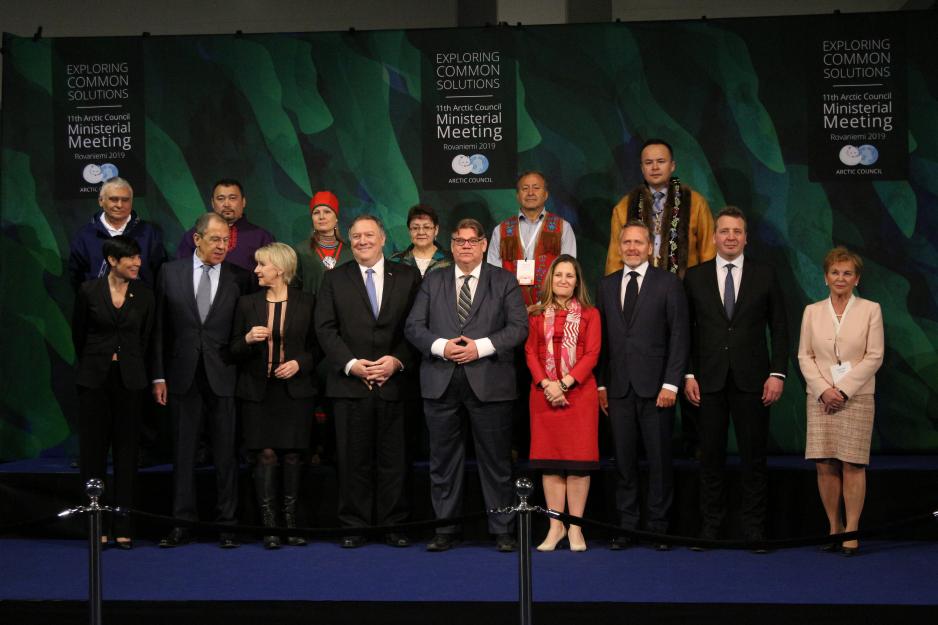Reuters: Arctic Council May Be Nominee for the Nobel Peace Prize

The foreign ministers and the permanent members of the Arctic Council at the Arctic Council Ministerial Meeting in Rovaniemi, May 2019. Photo: Siri Gulliksen Tømmerbakke
- The way the Arctic Council manages conflicts and opposing views in a region where the countries hold a great many differences is simply admirable, says Eirik Sivertsen (Labor), Chair of the Norwegian Parliament’s delegation for Arctic parliamentary cooperation.
The winner of the 2019 Nobel Peace Prize is announced in Oslo on 11 October, and one of the names that have frequently come up is the Arctic Council, according to Reuters.
There are a total of 301 nominees for the 2019 Nobel Peace Prize, 223 of which are individual persons and 78 organizations, according to the Nobel Committee’s home pages.
The Nobel Committee evaluates all nominations before a shortlist with the most interesting and worthy candidates is created, a shortlist that forms the foundation for further investigations and examinations by the permanent consultants as well as other Norwegian or foreign experts of the Nobel Committee.
The Arctic Council was established in 1996 and consists of representatives from all eight Arctic states; the USA, Canada, Russia, Finland, Norway, Denmark and Iceland.
- A success
- The Arctic Council has been nominated before and I believe the Council has been a success insofar that it has contributed in accordance with what all states have stressed in their Arctic strategies: To keep the region peaceful and stable despite the world around it having been turbulent, says Eirik Sivertsen, Chair of the Norwegian Parliament’s Delegation for Arctic Cooperation, to High North News and continues:
- The way the Arctic Council manages conflicts and opposing views in a region where the countries hold a great many differences is simply admirable.
- Eirik Siversten stresses that the Nobel Committee works completely independent from Norwegian political authorities such as the Storting (parliament) and the government.
Roughing it up in Rovaniemi
The day-to-day work of the Arctic Council goes on in the many working groups where experts across the borders conduct research on a.o. climate and environment as well as sustainable development. The Council stays out of security policy issues and big politics. Nevertheless, this is exactly what was drawn into the limelight during the last Arctic Council Ministerial Meeting in Rovaniemi, Finland earlier this year.
The chairmanship of the Council rotates on a bi-annual basis and last May, it was transferred from Finland to Iceland. That did not happen quietly.
The incident receiving the most widespread attention was when US Secretary of State Mike Pompeo entered the podium the day before the Ministerial Meeting and gave an unannounced speech in which he lashed out against Russia, China and in part also Canada.
The USA also argues that Russia violates international law along the Northern Sea Route and contributes to a military arms race in the High North.
The 2019 Ministerial Meeting was also the first such meeting ever in which the member states did not manage to agree on a final declaration as the USA blocked a reference to climate changes that was strongly worded and clear enough for the other seven member states.
The Arctic Council a Priority
Nevertheless, as Norwegian Foreign Minister Ine Eriksen Søreide pointed out to High North News immediately after the Rovaniemi Ministerial Meeting:
- This is in fact only the second time ever that all eight foreign ministers are convened. And that goes to say something about the priorities made in the Arctic Council.
The Nobel Committee’s decision will usually be made during the final committee meeting before the announcement at the beginning of October. The committee strives to reach a consensus when selecting a laureate.
304 candidates is the fourth-highest number of nominees ever. The record so far was set in 2016, with 376 nominees.
The announcing of the winner of this year’s Nobel Peace Price will take place on Friday 11 October and the award ceremony is in Oslo on 10 December.
